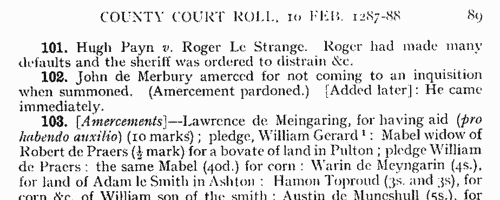Brunley Surname Ancestry ResultsOur indexes 1000-1999 include entries for the spelling 'brunley'. In the period you have requested, we have the following 3 records (displaying 1 to 3): Buy all | | | Get all 3 records to view, to save and print for £14.00 |
These sample scans are from the original record. You will get scans of the full pages or articles where the surname you searched for has been found. Your web browser may prevent the sample windows from opening; in this case please change your browser settings to allow pop-up windows from this site. Cheshire Court Rolls
(1259-1290)
Civil and criminal cases for most of Cheshire were handled by the county courts. Here we have the county court rolls for November 1259 to August 1260, December 1281 to September 1282, and December 1286 to September 1289. The city of Chester exercised its own jurisdiction, and here we have crown pleas and presentments from 1287 to 1297. The royal manor of Macclesfield in the east of the county had three independent jurisdictions - the hundred, forest and borough. Royal justices in eyre dealt with civil and criminal cases from the hundred and forest during their yearly visits, and here we have records from 1284 to 1290. Also covered by this index is an Inquest of Service in Time of War in Wales of 1288, listing knight's fees in the county. BRUNLEY. Cost: £4.00.  | Sample scan, click to enlarge

|  British merchant seamen
(1835-1840) British merchant seamen
(1835-1840)
At this period, the foreign trade of ships plying to and from the British isles involved about 150,000 men on 15,000 ships; and the coasting trade about a quarter as many more. A large proportion of the seamen on these ships were British subjects, and so liable to be pressed for service in the Royal Navy; but there was no general register by which to identify them, so in 1835 parliament passed a Merchant Seamen's Registration Bill. Under this act a large register of British seamen was compiled, based on ships' crew lists gathered in British and Irish ports, and passed up to the registry in London. A parliamentary committee decided that the system devised did not answer the original problem, and the original register was abandoned after less than two years: the system was then restarted in this form, with a systematic attempt to attribute the seamen's (ticket) numbers, and to record successive voyages. The register records the number assigned to each man; his name; age; birthplace; quality (S = seaman, &c.); and the name and official number of his ship, with the date of the crew list (usually at the end of a voyage). Most of the men recorded were born in the British Isles, but not all. The system was still very cumbersome, because the names were amassed merely under the first two letters of surname; an attempt was made to separate out namesakes by giving the first instance of a name (a), the second (b), and so on. During 1840 this series of ledgers was abandoned, and a new set started with names grouped together by surname. BT 112/8BRUNLEY. Cost: £8.00.  | Sample scan, click to enlarge

|  Soldiers and staff in Wellington Barracks, Westminster
(1851) Soldiers and staff in Wellington Barracks, Westminster
(1851)
The 1851 census enumerators' books for the mass of the population record the information as in this sample scan. However, there were also separate books for the major public institutions. The instructions for the first column (Name and Surname of each Person who abode in the Institution on the Night of the 30th March, 1851) run: "Write after the Name of the Master or Head of the Institution the Names of his Wife, Children, other Relatives, and Servants; then the Names of the Officers, their Families, and Servants. Commence the list of Inmates for which the Institution is provided on another page." For the second column (Position in the Institution): "State whether the person is the Head, or an Officer or Servant, or the Wife, Son, Daughter, or other relative of such Officer or Servant. If an Inmate, state whether patient, soldier, scholar, &c." For the third column (Condition): "Write 'Married,' 'Widower,' 'Widow,' or 'Unmarried,' against the Names of all Persons except Young Children." For the fourth column (Age (last Birthday)): "For Infants under One Year state the Age in Months, writing 'Under 1 Month,' '1 Month,' '2 Months,' &c." For the fifth column (Rank, Profession or Occupation): "State here the profession, or what is believed to have been the ordinary occupation of the Inmate before admission into the Institution. Carefully distinguish in this column the different kinds of 'laborers,' and those who have been masters in trade from others." For the sixth column (Where Born): "Opposite the Names of those born in England, Scotland, or Ireland write the County, and Town or Parish. If born in the British Colonies, the East Indies, or in Foreign Parts, state the Country; in the last case, if a British Subject, add 'British Subject.'" For the seventh column (Whether Blind, or Deaf-and-Dumb): "Write 'Deaf-and-Dumb,' or 'Blind,' opposite the Name of the Person.'" Wellington Barracks was in the city of Westminster; in the parish of St Margaret and the ecclesiastical district of Christ Church; in Westminster superintendent registrar's district, and St Margaret registrar's district. There were four officers, two family members, 15 servants, and 609 soldiers and wives. HO 107/1480
BRUNLEY. Cost: £2.00.  | Sample scan, click to enlarge

|
Research your ancestry, family history, genealogy and one-name study by direct access to original records and archives indexed by surname.
|






